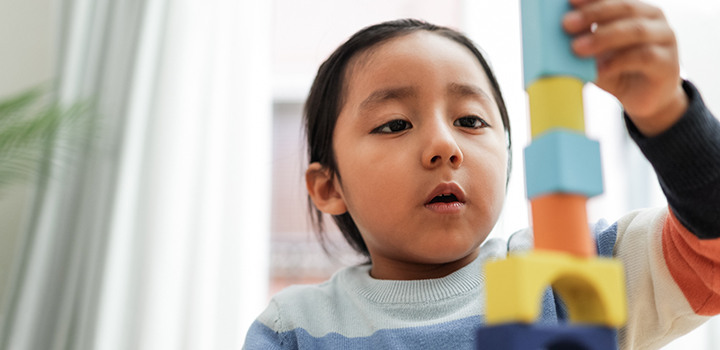Research shows why some children may be slower to learn words
By: Communications

New research from University of East Anglia reveals why some children may be slower to learn words than others.
A study published today investigates where toddlers look when they learn new words. It finds that children with larger vocabularies looked quickly towards objects when learning new words.
Meanwhile, children who knew fewer words looked back and forth between objects and took more time.
The research team say that their findings could help identify children with delays in language development at an earlier stage.
Importantly, it means these children could be given earlier support to build their best vocabulary before starting school.
Lead researcher Dr Larissa Samuelson, from UEA’s School of Psychology, said: “At around two years of age, children start to be quicker to decide what a new word means. We think this is because many of the first words children learn are names for sets of things that are similar in shape – balls are round, cups are cup-shaped.
“Children learn that if you hear a new word, other objects that are the same shape can also most likely be called by this name.
“This helps them learn new words quickly because they have an idea what a new word means right away.
“But there may be differences in the way that children who struggle with language learn new words and understand what new words mean.
“We wanted to better understand this phenomenon to see how it could support early word learning.”
The research team studied how 66 children aged between 17 and 31 months learn new words in a simple game.
They showed the toddlers new objects made from clay, plaster, Styrofoam, yarn and plastic mesh. The researchers then told the children the names of the new objects and asked them what other things can also be called by that name.
Crucially, the team filmed where the children were looking throughout the task. They were then able to watch it back frame-by-frame to see where the toddlers were looking before and after they were presented with a new object.
“We know that when adults and children hear a word they know, they look towards things in the world that match the words they hear. We wanted to see if this was different depending on how many words you know,” said Dr Samuelson.
So the researchers also asked parents how many words their children can say.
Dr Samuelson said: “We found that children who can say more words quickly looked towards objects that were the same shape as a named object. Children who knew fewer words looked back and forth between the objects and took more time.
“Other research has shown that children with Developmental Language Disorder do not pay attention to the same things when learning new words as children with typical language development.
“At the moment you can’t diagnose children with Developmental Language Disorder until they are three or four. But we hope that our findings could help determine which children are at risk for language delay at an earlier stage so that they can get better support.
“Our research has previously shown that we can boost word learning in children by helping them learn what to pay attention to when they hear a new word.
“If we can figure out which children need this support earlier, we can help them build their best vocabulary and be more ready to enter school with the language skills they need.”
This research was led by the University of East Anglia in collaboration with Augustana College, Illinois (US) and Durham University.
‘Vocabulary and automatic attention: The relation between novel words and gaze dynamics in noun generalization’ is published in the journal Developmental Science.
Related Articles

Fresh evidence of ChatGPTs political bias revealed by comprehensive new study
The artificial intelligence platform ChatGPT shows a significant and systemic left-wing bias, according to a new study by the University of East Anglia (UEA).
Read more
A values crisis underpins the biodiversity and climate emergency
A new study published in Nature shows how undervaluation of nature is foundational to the environmental crisis we face.
Read more
Study reveals the increasing cost of debt caused by climate change
Climate change will increase the cost of sovereign and corporate debt worldwide according to new research led by the University of East Anglia (UEA) and the University of Cambridge.
Read more